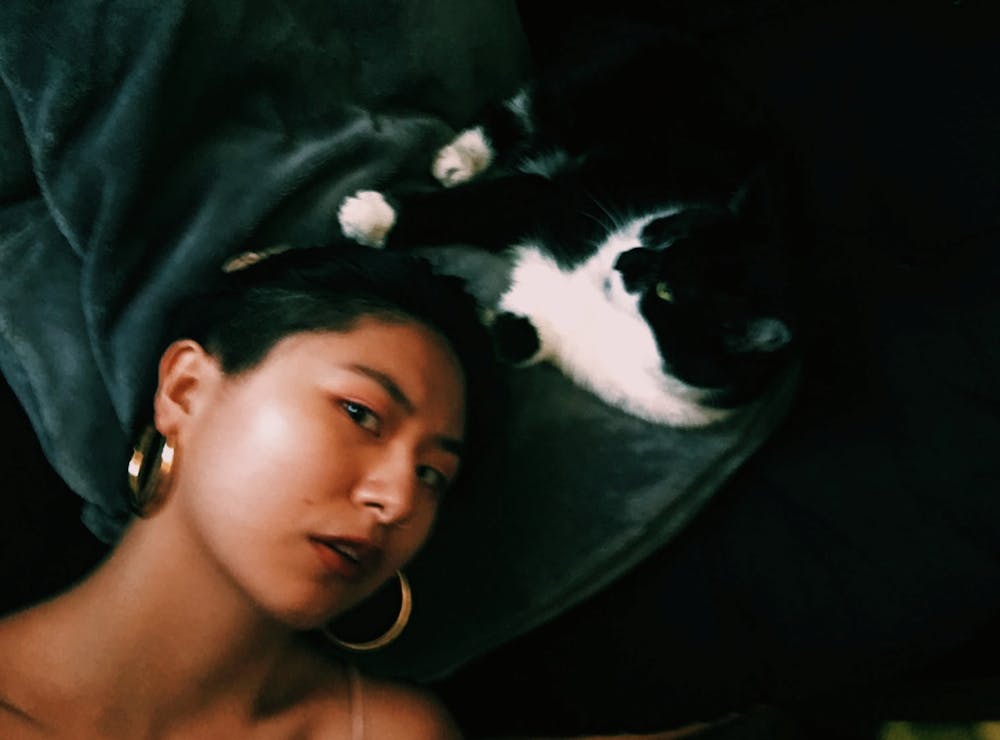The first time they read non–rhyming poetry, “it felt like it belonged to me,” says Erin O’Malley (C’21). As a self–taught poet, much of their inspiration comes from other Asian–American writers like Ocean Vuong or K–Ming Chang who use poetry as a means of expressing cultural narratives. As an Asian–American adoptee, Erin’s personal connection to Asian culture differs from the Asian writers they seek inspiration from. Because of this, they sought other themes to authentically center their creativity.
Erin elaborates, saying, “All of the writing that I had seen by Asian–American writers that considered identity in some way drew from a catalogue of imagery that I personally wasn’t a part of.” Instead, Erin forefronts American popular culture in their work. “I think there is this idea that people can only write about certain things in poetry. Like you can only write about rivers and the moon—both of which are great. I love rivers. I love the moon. But, I really like using pop culture in my writing as a site to think about how people might be experiencing the world outside of a very explicit identity politics,” says Erin.
Upon transferring to Penn their sophomore year, Erin was searching for a sense of community, which they found in the Excelano Project, Penn’s premier spoken word poetry group. Now, as president of the organization, Erin has a strong appreciation for artistic collaboration. More specifically, they say, “I love that I’ve been able to write with a group of people that are primarily also FGLI, queer writers of color. In the time that I’ve been writing, the spaces I’ve been writing in have mostly not been reflective of my experiences. I’ve been very happy to have that space while at Penn.”
Erin’s poetry has received much praise, with one example being the TransPoetics prize from the What Are Birds? journal. This prize was special to Erin not only because it validated them as a writer, but because it recognized them as a trans writer specifically.
Their passion for poetry also extends to theory and academic literature, modes of writing Erin views as equally important. ”I always think of both theory and poetry being modes of trying to articulate maybe a really common feeling that otherwise doesn’t have language yet,” says Erin. To combine their interests, Erin is drawing on their Comparative Literature Honors Thesis to host an event in collaboration with the Asian American Studies Program. The colloquium, called “(Alien)ation: Asian Aliens in 19th Century Science Fiction Comics” will be held on Oct. 23. Like the title suggests, it will consider the immigration term ‘alien’ with respect to depictions of Asian immigrants as aliens in early 19th–century science fiction comics in a way that Erin hopes will help attendees think about the intersections and interactions between popular culture and themes like the American legal system.
While Erin plans to pursue a Ph.D that isn’t necessarily related to creative writing, they maintain that they will always want to write creatively alongside their other work. And, because they don’t always have time during the school year to write outside of Excelano Project meetings and assignments, whenever they encounter a word or concept in their day to day life that inspires them, they catalogue it in their phone. So, when they do have time to write, they’ll have an archive of ideas.
Despite how busy they are, Erin is always reading, and advises other aspiring writers to do so, too. “As advice for other writers, any experience of the world, whether it be reading or just being outside, will ultimately fuel your writing,” Erin says. “Whenever you do sit down to write, your writing will be a consequence of that.”







